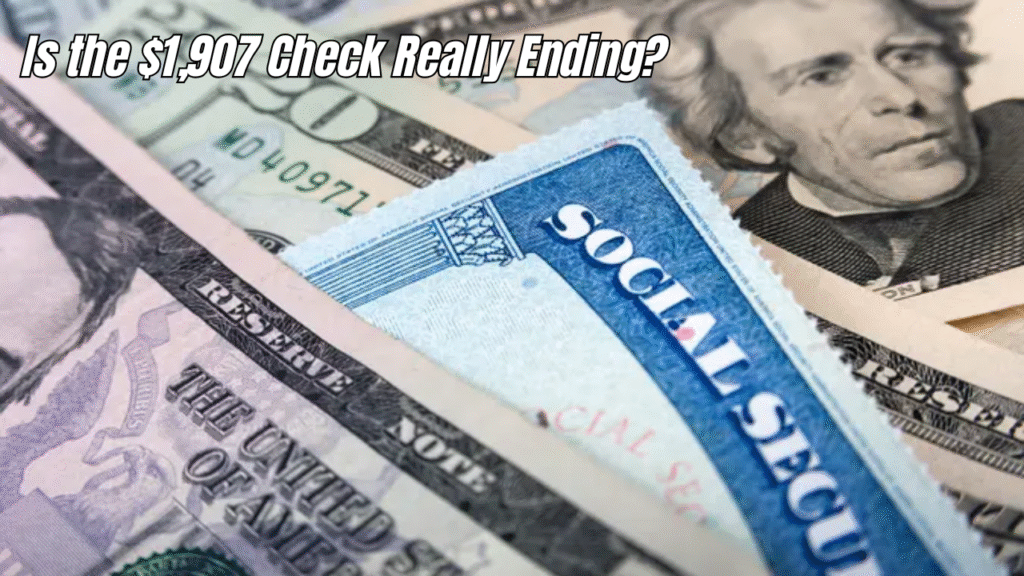Introduction
The news of a possible end or reduction of the $1,907 monthly Social Security check has stirred concern among millions of American retirees. Social Security serves as the financial backbone for over 67 million Americans, and any talk of disruption—even speculative—sends shockwaves through the community.
In June 2025, questions are mounting: Will the $1,907 check vanish? Is it a temporary change? Who is affected, and why? This article explores every facet of this issue, including payment breakdowns, eligibility factors, legislative possibilities, and what retirees can do to prepare.
Section 1: Understanding the $1,907 Social Security Payment
1.1 What Does the $1,907 Represent?
The $1,907 figure is close to the average Social Security retirement benefit for a retired worker in early 2025. It reflects a blend of income replacement for years of contribution into the system.
1.2 Breakdown of Benefits
| Component | Details |
|---|---|
| Average Monthly Payment (2025) | $1,907 for individual retirees |
| Dual-Spouse Households | Up to $3,289 combined |
| Disability Insurance Benefits | Approx. $1,537 (average) |
| Survivors Benefits | Varies by survivor age and relationship |
1.3 Calculation Factors
Social Security benefits are based on:
- Lifetime earnings history
- Full Retirement Age (FRA)
- Age at claiming benefits
- Cost of Living Adjustments (COLA)
Section 2: Why Is There Talk of Ending or Changing the $1,907 Check?
The speculation stems from several economic and legislative pressures:
2.1 Social Security Trust Fund Shortfall
The Old-Age and Survivors Insurance (OASI) Trust Fund is projected to be insolvent by the mid-2030s, which could result in a 23% reduction in benefits unless Congress acts.
2.2 Rising Retiree Population
As baby boomers continue to retire, the number of beneficiaries is increasing faster than the number of contributors, placing a strain on Social Security’s financing.
2.3 Inflation and Budgetary Realignment
Persistent inflation and national budget deficits are prompting policymakers to explore entitlement program reforms. This includes discussions around:
- Raising the retirement age
- Taxing high-income beneficiaries more
- Restructuring benefit formulas

Section 3: Is the $1,907 Check Really Ending?
3.1 No, but Changes Could Come
As of June 2025, there is no official plan to end the $1,907 Social Security check, but adjustments are likely in the future if funding is not stabilized.
3.2 Potential Changes Ahead
| Scenario | Impact on $1,907 Check |
|---|---|
| Raise Full Retirement Age | Delays access to full benefit |
| Reduce COLA Adjustments | Slower annual increase |
| Restructure Payout Formula | Lower payments for higher earners |
| Increase Payroll Tax Cap | Preserves current benefits |
Section 4: Who Is Most at Risk?
4.1 Vulnerable Groups
| Category | Why at Risk |
|---|---|
| Early Claimers (62-64) | Smaller base benefit locked in for life |
| Low-Income Retirees | Heavily reliant on Social Security only |
| Younger Workers (Under 45) | Will face long-term structural changes |
| High Earners | May face increased taxation |
4.2 Safety Nets
- Supplemental Security Income (SSI)
- Medicaid
- State-sponsored senior programs
Section 5: Alternatives Under Discussion in Congress
5.1 Expansion Bills
- Some lawmakers propose expanding Social Security and increasing minimum benefits.
5.2 Reform Proposals
| Proposed Action | Effect on Retirees |
|---|---|
| Increase payroll tax rate | Larger Social Security trust fund |
| Lift earnings cap (currently $168,600) | More funding from high earners |
| Change COLA formula (CPI-E) | More accurate inflation adjustment |
Section 6: Table – Future Benefit Scenarios
| Policy Change | Monthly Benefit Estimate |
|---|---|
| Status Quo (no reform) | $1,907 through 2033, then drop |
| 23% Cut in 2033 | ~$1,470 |
| Reform via Tax Increase | $1,907 stable or higher |
| FRA Raised to 70 | Delayed but full $1,907 |

Section 7: How to Prepare for Potential Changes
7.1 Diversify Retirement Income
- Employer-sponsored pensions
- Personal retirement accounts (401(k), IRA)
- Investments (dividends, real estate)
- Part-time work
7.2 Delay Benefits If Possible
Delaying benefits up to age 70 increases your monthly payout by as much as 24-32% over early claiming.
7.3 Use SSA Tools
- My Social Security Account: Estimate your benefits
- Benefit calculators: Plan scenarios for future
Section 8: Retirement Budgeting in Case of Lower Checks
| Expense Category | Adjustments If Benefits Drop |
|---|---|
| Housing | Downsize, rent out a room |
| Food | SNAP benefits, senior discounts |
| Healthcare | Medicaid, Medicare Advantage plans |
| Transportation | Public transit, reduce car ownership |
| Entertainment | Community centers, free local events |
Conclusion
The $1,907 monthly Social Security check is not ending in June 2025, but its long-term stability is in question. The looming trust fund depletion and rising budget deficits have placed immense pressure on the program.
Congress has several tools at its disposal, and while changes may be necessary, the most vulnerable retirees must be protected.
The best approach today is to stay informed, diversify income sources, and plan ahead. If you’re not yet retired, it’s wise to factor potential Social Security cuts into your broader retirement strategy.
FAQs
1. Is the $1,907 Social Security payment ending in June 2025?
No. As of now, there are no official plans to stop or reduce the $1,907 monthly payment. However, future changes to the program are being debated.
2. What could reduce my monthly Social Security check in the future?
Factors include potential legislative reforms like raising the retirement age, changing the cost-of-living adjustment formula, or modifying benefit calculations.
3. What can I do to protect my retirement income?
You can delay claiming benefits, invest in other income streams, build emergency savings, and use tools like My Social Security to track future projections.
4. Will I be notified if Social Security payments change?
Yes. The Social Security Administration (SSA) will notify beneficiaries well in advance through official communication channels if any structural changes occur.
5. Can Social Security run out of money completely?
No. Even if the trust fund is depleted, payroll taxes will continue to fund a majority of benefits—though payments may be reduced without reforms.


